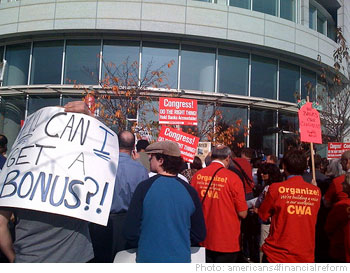 The big banks are pre-testing their main messages for bonus season, which starts in earnest next week. Their payouts relative to profits will be “record lows”, their people won’t make as much as in 2007 (except for Goldman), and they will pay a higher proportion of the bonus in stock than usual. Behind the scenes, leading executives are still arguing out the details of the optics.
The big banks are pre-testing their main messages for bonus season, which starts in earnest next week. Their payouts relative to profits will be “record lows”, their people won’t make as much as in 2007 (except for Goldman), and they will pay a higher proportion of the bonus in stock than usual. Behind the scenes, leading executives are still arguing out the details of the optics.
As they justify their pay packages, the bankers open up a broader relevant question: How much bonus do they deserve in this situation? After all, bonus time is when you decide who made what kind of relative contribution to your bottom line – and you are able to recognize unusually strong achievement.
Seen in these terms, the answer is easy: people working at our largest banks – say over $100 bn in total assets – should get zero bonus for 2009.
The big bank executives make three points in favor of paying bonuses for 2009.
1. If the bonuses are not paid, people will leave our major banks. It’s unlikely that many good people will leave, but if they do move to smaller institutions that are not Too Big To Fail, that’s good for the rest of us.
2. Big banks made these profits fair-and-square, so the bonuses belong to the workforce. This is wrong at two levels (a) the profits in 2009 (and 2008) were solely the result of massive government intervention, designed at saving and recapitalizing big banks, and (b) the recapitalization part of that strategy only works if the profits generated are retained – not if they are paid out.
3. You cannot now tax the bonuses for 2009 without violating all the norms of reasonable taxation – i.e., that it not be retroactive, not be confiscatory, and not mess seriously with incentives. Ordinarily, these are good arguments. But today’s circumstances are so egregious that we need to take highly unusual steps. The banks and their key employees are so far from understanding what they did wrong, they don’t even have a framework within which they can understand what they need to do right going forward. This industry needs a wake-up call.
The administration should immediately propose and the Congress must at once take up legislation to tax the individuals who receive bonuses from banks that were in the Too Big To Fail category – using receipt of the first round of TARP funds would be one fair criterion, but we could widen this to participation in the stress tests of 2009.
The supertax structure being implemented in the UK is definitely not the right model – these “taxes on bonuses” are being paid by the banks (i.e., their shareholders – meaning you, again) and not by the people receiving the bonuses.
Essentially, we need a steeply progressive windfall income tax – tied to the receipt of a particular form of income. This is tricky to design right – but a lot of good lawyers can get cranking.
And we should be honest about the distortionary effect that even proposing such legislation will have on incentives. It will send a signal that income generated by working at big banks is less secure – all employees of these banks should be looking over their shoulders; sooner or later, the Internal Revenue Service is coming. This is particularly relevant for 2010, which looks set to be another bumper year for the financial sector.
At this stage, tilting the playing field towards smaller participants in financial markets is not a bug, it’s a desperately needed feature.
Disclaimer: This page contains affiliate links. If you choose to make a purchase after clicking a link, we may receive a commission at no additional cost to you. Thank you for your support!


Excessive executive compensation, while excruciatingly obvious in the case of the big banks, is not at all limited to these institutions. A major reason, if not the only substantial reason for this problem, is historically low marginal tax rates, especially those on unearned income. There is therefore every reason to not limit a windfall income tax to bank executives.
The marginal (and I want to really emphasize that word, MARGINAL) tax rate on the “McCain Rich” those with $5MM incomes (as defined by John McCain during the Presidential campaign) and above should be at least 45%, and that rate should be on all types of income, not just salary – the 15% top marginal rate on capital gains is a huge driver of wealth consolidation.
Further, there should be a 55% or higher marginal rate on the 10x over McCain-Rich, those with $50MM annual incomes, and when you get to the 100x McCain-Rich, $500MM annual incomes, the marginal rate (meaning the rate on the amount over $500MM) should be 90%.
Restoring marginal tax rates to the range of what they were when Eisenhower was President is the only way we are going to reign in the huge excesses of corporate management and restore some margin of financial security for the middle class.